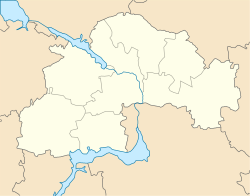Samar, Ukraine
Samar
Самар | |
|---|---|
 Holy Trinity Cathedral | |
| Coordinates: 48°38′N 35°13′E / 48.633°N 35.217°E | |
| Country | |
| Oblast | Dnipropetrovsk Oblast |
| Raion | Samar Raion |
| Hromada | Samar urban hromada |
| Founded | 1672 |
| City status | 1784 |
| Area | |
• Total | 36 km2 (14 sq mi) |
| Elevation | 62 m (203 ft) |
| Population (2022) | |
• Total | 69,855 |
• Estimate (2024)[1] | 66,973 |
| • Density | 1,900/km2 (5,000/sq mi) |
| Postal code | 51200-51214 |
| Area code | +380-5693 |
 | |
Samar (Ukrainian: Самар), formerly known as Novomoskovsk (Ukrainian: Новомосковськ) until 2024, is a city and municipality in Dnipropetrovsk Oblast, Ukraine. It serves as the administrative center of Samar Raion within the oblast. Samar is located predominantly on the right bank of the Samara River, a left tributary of the Dnieper River. The city is located 27 kilometres (17 mi) from the administrative center of the oblast, Dnipro. As of January 2022, Novomoskovsk's population was approximately 69,855.[2]
History
[edit]A city with the name Samar (now known as Old Samar) has existed from the end of the 17th century.[3][4] The Cossacks abandoned the town in 1688 when Russia built the Bohorodytska Fortress in the city. Soon after, the former inhabitants of the Old Samar founded another settlement named Samar upstream the Samara River. In 18th-century documents, the city is also named Samarchyk, Novoselytsia or Palanka. The town was the administrative center of the Samar Palanka (province) of the Zaporozhian Cossacks.[3][5]
In 1777, a town named Yekaterinoslav, meaning "the glory of Catherine" (after Russian empress Catherine II),[6] was built on the location. The site was badly chosen – spring waters transformed the city into a bog.[7][8] The surviving settlement was in 1794 renamed Novomoskovsk.[3][9][10] The city name Yekaterinoslav was given to current Dnipro.[8]
The city is famous for the Holy Trinity Cathedral, built in 1778 by Yakym Pohrybniak from wood without any nails. A novel dedicated to the cathedral by Ukrainian writer Oles Honchar became a classic of 20th-century Ukrainian literature.
In 1917 the Ukrainian People's Republic tried to rename Novomoskovsk to Samar.[3][5]
Until 18 July 2020, Novomoskovsk was incorporated as a city of oblast significance and served as the administrative center of Novomoskovsk Raion though it did not belong to the raion. In July 2020, as part of the administrative reform of Ukraine, which reduced the number of raions of Dnipropetrovsk Oblast to seven, the city of Novomoskovsk was merged into Novomoskovsk Raion.[11][12]
Following the Russian invasion of Ukraine in 2022, the city council voted in January 2024 to rename Novomoskovsk to Nova Samar (Нова Самарь).[13] On 19 September, the Verkhovna Rada voted to rename Novomoskovsk to Samar.[14]
Demographics
[edit]In 2001, Samar (at the time Novomoskovsk) had a population of 71,860 people. In terms of ethnicity, Ukrainians constitute a large majority, accounting for over 80% of the population. The second-largest group are people with an ethnic Russian background (13%), while the remaining population consists of Belarusians, Germans, Armenians, people of Turkic origin, Jews and Romani people. The exact ethnic composition was as follows:[15]
Notable people
[edit]- Stepan Koval (born 1965), film director and animator
- Viktor Skrypnyk (born 1969), football manager
Gallery
[edit]-
Samar monastery
-
Former synagogue building in Samar
-
St. Nicholas Cathedral
-
Novomoskovsk Technical Institute
-
Stalinist architecture
-
A residential building in downtown Samar
See also
[edit]References
[edit]- ^ https://uk.zhujiworld.com/ua/390443-novomoskovsk/
- ^ Чисельність наявного населення України на 1 січня 2022 [Number of Present Population of Ukraine, as of January 1, 2022] (PDF) (in Ukrainian and English). Kyiv: State Statistics Service of Ukraine. Archived (PDF) from the original on 4 July 2022.
- ^ a b c d Ratsybarska, Yuliia (13 May 2023). Подалі від Москви. Як перейменують місто Новомосковськ на Дніпропетровщині? [Farther from Moscow. How to rename the city of Novomoskovsk in Dnipropetrovsk Oblast?]. Radio Free Europe (in Ukrainian). Retrieved 29 July 2023.
- ^ Mikhail Levchenko. Hanshchyna (Ганьщина Україна). Opyt russko-ukrainskago slovari︠a︡. Tip. Gubernskago upravlenii︠a︡, 1874.
- ^ a b Meshko, Konstiantyn (2023-05-01). Не Новомосковськ, а Самар [Not Novomoskovsk, but Samar]. Istorychna Pravda.
- ^ Cybriwsky, Roman (2018). Along Ukraine's River: A Social and Environmental History of the Dnipro. Central European University Press. p. 61. ISBN 9789633862049.
- ^ "www.eugene.com.ua Dnepropetrovsk History". Eugene.com.ua. Retrieved 28 November 2014.
- ^ a b Establishment and development of the Dnipropetrovsk city (Виникнення і розвиток міста Дніпропетровськ). The History of Cities and Villages of the Ukrainian SSR.
- ^ (in Ukrainian) New Kodak, Museum Of Dnipro City History (26 March 2022)
- ^ S. S. Montefiore: Prince of Princes – The Life of Potemkin
- ^ "Про утворення та ліквідацію районів. Постанова Верховної Ради України № 807-ІХ". Голос України (in Ukrainian). 2020-07-18. Retrieved 2020-10-03.
- ^ "Нові райони: карти + склад" (in Ukrainian). Міністерство розвитку громад та територій України. 17 July 2020.
- ^ Rudenko, Iryna; Palamarchuk, Polina; Vahner, Olha (2024-01-23). "Новомосковськ на Дніпропетровщині отримав нову назву: за який варіант проголосували депутати". Suspilne (in Ukrainian).
- ^ Проект Постанови про перейменування окремих населених пунктів та районів [Draft resolution on renaming individual populated places and raions]. Retrieved 2024-09-19.
- ^ "Національний склад міст". Datatowel.in.ua (in Ukrainian). Retrieved 2024-11-08.
External links
[edit]- (in Ukrainian) Official city website










